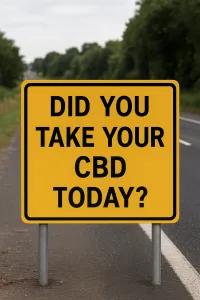Can CBD Get You High? Understanding CBD’s Effects on the Body
As cannabis products gain popularity, CBD (cannabidiol) has become a household name for its potential wellness benefits. From gummies to oils, CBD is marketed as a natural way to reduce stress, ease pain, and promote calm. But a common question persists: can CBD get you high? This concern often stems from confusion about cannabis and its compounds. Let’s clear up the myths, explore how CBD works, and explain why it won’t leave you feeling intoxicated.

What is CBD?
CBD is one of over 100 compounds, called cannabinoids, found in the cannabis plant. Unlike THC (tetrahydrocannabinol), the compound responsible for the euphoric "high" associated with marijuana, CBD is non-psychoactive. This means it doesn’t alter your mental state or produce the giggly, disoriented feeling often linked to cannabis use. CBD is typically derived from hemp, a type of cannabis with low THC levels (0.3% or less), making it legal in many places and widely available in products like tinctures, creams, and edibles.
How CBD Works in the Body
To understand why CBD doesn’t get you high, it helps to know how it interacts with your body. CBD works with the endocannabinoid system, a network of receptors that regulates functions like mood, sleep, pain, and stress. Unlike THC, which binds directly to CB1 receptors in the brain, causing psychoactive effects, CBD influences these receptors indirectly. It enhances the body’s natural endocannabinoids, promoting balance without triggering euphoria or impaired cognition.
This interaction is why is often associated with feelings of calm, reduced anxiety, or relief from discomfort. Some users report mild drowsiness or a sense of relaxation, especially at higher doses, but these effects are distinct from the intoxicating high of THC.
Why CBD Won’t Get You High
The key reason CBD doesn’t get you high is its lack of psychoactive properties. Here’s a closer look at why:
Non-Psychoactive Nature:
CBD doesn’t bind strongly to CB1 receptors in the brain, which are responsible for the altered mental state caused by THC. Instead, it modulates these receptors to support wellness without changing perception or cognition.
Low THC Content in Hemp-Derived CBD:
Most CBD products are made from hemp, which legally contains 0.3% or less THC. This trace amount is too small to produce a high, even in large doses.
Isolated CBD Products:
Many CBD products, like isolates, contain only CBD with no THC at all. These are guaranteed to produce no psychoactive effects. Shop them at beewellcbd.info.
Can CBD Ever Feel Like a High?
While CBD itself doesn’t get you high, some people might perceive its effects as similar, especially if they’re new to it. For example:
Relaxation or Drowsiness:
High doses of CBD (e.g., 100 mg or more) can cause mild sedation, which some might mistake for a high. This is more about feeling sleepy than euphoric.
Full-Spectrum CBD Products:
These contain trace amounts of THC (within legal limits) along with other cannabinoids. While the THC level is too low to get you high, sensitive individuals might notice subtle effects, especially if they consume large amounts.
Expectations and Placebo Effect:
If someone expects to feel high, they might interpret CBD’s calming effects as something more intense than they are.
To avoid any confusion, always check product labels. Full-spectrum CBD includes trace THC, while broad-spectrum and CBD isolates are THC-free.
Choosing Safe and Effective CBD Products
To ensure CBD works as intended without unexpected effects, follow these tips:
Buy from Reputable Sources:
Choose products from trusted brands that provide third-party lab results confirming CBD and THC content. This ensures you’re getting pure CBD with no significant THC.
Start with a Low Dose:
Begin with 5-10 mg of CBD and gradually increase until you find the right amount for your needs. This minimizes the chance of side effects like drowsiness.
Check for THC Content:
If you want to avoid any psychoactive risk, opt for broad-spectrum or isolate CBD products, which contain no THC.
Consult a Doctor:
If you’re on medications or have health conditions, talk to a healthcare provider, as CBD can interact with certain drugs.
Benefits of CBD Without the High
CBD’s appeal lies in its ability to offer potential benefits without intoxication. Research and user reports suggest CBD may help with:
Reducing anxiety and stressImproving sleep qualityEasing chronic pain or inflammationSupporting focus and mental clarity
These effects make CBD a popular choice for those seeking natural wellness tools without the mind-altering experience of THC.
Final Thoughts
CBD does not get you high, making it a versatile option for people looking to manage stress, pain, or sleep issues without impairing their daily life. By understanding how CBD works and choosing high-quality, low- or no-THC products, you can enjoy its benefits with confidence. Whether you’re new to CBD or a regular user, always prioritize reputable sources and start with small doses to find what works best for you.
